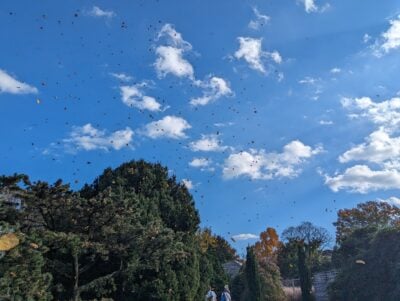
how to succeed in business without really trying by Alan Z. '23, MEng '24
on leadership, being bad at things, and musicals
I’ve never considered myself a very natural leader. I’m usually pretty reserved, and, although I think I’ve become a lot less shy over the past few years, I have been told that I still don’t come off as particularly friendly, or, to be completely honest, even as normal.01 this review provided by the father of one of my friends. Incidentally, the phrase "one of my friends’ dads" feels very natural when spoken, but absolutely horrific when written down. Still, in the past few years, I’ve been in charge of many a thing, between music directing my acapella group to serving as the president of a dorm, or the vice president of the entire Dormitory Council, which are certainly not small positions.
I’ve always put my election to these roles up to a couple of very explainable factors. First and foremost, it is very easy to convince me to do things when no one else is doing them,02 which, honestly, is more of a kind of savior complex than a positive thing. and, in the years immediately post-COVID, there simply was not a lot of upperclassmen engagement. Second, I am pretty good at assessing a situation and deciding on a course of action, which is very useful for student government in particular, and I do like making high-level plans to get things done, which is kind of generically useful.
In other words, I’ve always felt more like a technocrat than someone selected because they were actually “a leader,” i.e., someone who has the people skills to make sure everybody on a team is happy and healthy and working together, and who has the ability to make people respond honestly if things aren’t going well; someone who gives people what they need, whether it’s feedback, or cheerleading, or both; someone who’s capable of speaking up for their team to external parties. In many of my positions, I’ve been paired with another person who takes on these sort of soft skills, while I do more of the planning behind the scenes, and, most of the time, things turn out well.
This past month, I’ve been serving as the band director for a student production of the musical tick… tick… boom! here on campus. It’s a role that involves organizing and running rehearsals, mostly, and also serving as the piano-conductor for the band; that is to say, I both play piano and conduct03 I have been doing music for so long that I no longer have a good sense of whether the word "conductor" is common knowledge, so, in case you are wondering what I mean, here is <a href="https://en.wikipedia.org/wiki/Conducting">a link</a>. when I have a hand free and sometimes even when I don’t. It’s quite the coordination challenge—I have to play, conduct, and change patches04 i.e., keyboard sounds, like organ or synth or grand piano, etc. with my hands, operate a page turner and the sustain pedal with my feet, and listen and follow along with the rest of the band and the actors at the same time—but I’ve been having a good time trying to get it all under control without too many mistakes.05 one interesting philosophical thing about musical theatre is that, in my opinion, the real skill is recovering when things go wrong, which is somewhat distinct from playing all the notes perfectly. It's okay to make mistakes, but if that makes you panic and end the song or it messes up the actors, then that's a real problem.

the view from my little keyboard nook
By all accounts, I am not a good pianist. I haven’t played piano seriously since middle school; indeed, the last time I actually “performed” anything on piano was to fill a random spot for the State Solo and Ensemble Contest in high school, some six years ago. I play very occasionally, mostly to blow off steam when I’m frustrated or need a way to vent, or when I’m hanging out with people who enjoy a good bout of just singing and playing random songs without worrying about 100% accuracy.
I am also not a particularly good conductor. I’ve never had formal training of any sort, although I’ve been beating 3/4 and 4/4 patterns along to music on my own for probably a decade now, just because it’s a fun way to fidget. The first time I conducted anything was the Musical Theater Guild show last IAP,06 Independent Activities Period, a short term during January where students mostly do, well, 'independent activities' like smaller classes and competitions and whatnot. because there hadn’t been an orchestra at all the previous semester—there’s that “no else is doing it” thing again—and I wanted to make sure there was one for Heathers.
Still, the music has come together. I pull from all the techniques I’ve seen in high school orchestra rehearsals about how to run rehearsals, the age-old phrases like “I need this to be at my tempo, not yours” or the humble “let’s try that again.” For tick… tick… boom!, I’ve been using a lot of techniques from all the hours I spent playing in string quartets, the collective inhale and head raise at entrances, or just generally aggressive head nodding and body language. I know there are places I need to improve—I need to look up from my music more, and I don’t have as good of a listening ear as I’d like. I’d like to have more opinions about the sound of the ensemble as a whole, the dynamics, the phrasings, etc., in the way that I can pick sentences apart and improve them stylistically when I’m editing text. The music sounds decent, though, and the actors can sing along to it. Maybe it even sounds good, sometimes.
The vast majority of this success is owed to the practice of each of the individual musicians,07 and they are <em>so good</em>. but part of me thinks that at least part of it must be my doing. In these contexts, if the band keeps together and stays happy and healthy, and it’s not because of any particular musical expertise of mine, then at least a tiny portion of it might just be—wait a minute—leadership.
And, in the context of these small bands, from the seven-person band of Heathers to four-person band of tick… tick… boom!, I do notice myself doing those things that I thought I couldn’t do. Maybe it’s something about the collaborative nature of music in particular, but I’m constantly checking in with people—“how did people feel about that? would it help to do it again?”—and providing encouragement after runs, not eschewing the limited critique I have, but being clear about what was good, what needs to be done better, and, of those needs, which should be prioritized. Or, at least, it feels that way.
It’s weird—to be in charge despite being probably the worst musician in the room—but it still feels like it works out. Somehow, it all works out.
The truth of it is that, the more I consider it, the more I realize that I have simply grown into a person who is pretty okay at leading things. If you asked me to think about the skills which have been useful to me in leadership positions throughout the years, I can identify things that I think I’m good at. I feel like I’m good at assigning tasks to people in a dynamic situation that results in important tasks getting done, like for Next Thanksgiving. I feel like I’m good at listening to a lot of people’s opinions and sort of summarizing them in a way that brings groups towards a consensus, like for countless DormCon meetings. I care a lot about writing clear08 still working on the conciseness part of the equation. emails that communicate what needs to be done and how decisions are being made; and, now, I care a lot about team morale, and trying to make sure people feel empowered to do their best and speak up when they can’t, though perhaps it is still my greenest skill.

this feels like the right image for the occasion
The ultimate point is that my perception of myself is stuck in the past, stuck in this place that doesn’t admit any form of personal growth. I still think of myself as a violinist first, even though I’ve done almost exclusively singing and conducting over the past two years. I still think of myself as that shy, socially inept seventeen-year-old who stumbled onto MIT campus in 2019, who couldn’t possibly be a leader, rather than someone who has been leading different groups continuously for the past two-and-a-half years. I’ve been doing these things, feeling like I’m just making it up as I go, when really what I’ve been doing is learning on the job, and getting better as time passes. I am not who I used to be, and my brain is still catching up with that fact.
Perhaps it is simply that change and personal growth don’t happen quickly; it sneaks up on you, and it takes a new form each time. Recently, I wrote my 2,000th consecutive daily journal entry, two years and eight months after I wrote my 1,000th. In it, I wrote that:
I think it is strange, although understandable, however, that I feel much closer to the person I was 1000 days ago…than I feel like the person writing [1000 days ago] felt to the person writing [the first post.]…
Sure, that person…didn’t yet feel confident about what they wanted to do in life—but that person was on that track. I read 549,033 words and [my 1000th blog post], and I hear myself coming into myself, beginning to identify as a writer…and still yearning to understand, what, exactly, I am capable of. And, in that, I am happy with myself, I think.
So many of the changes which happened to me in those first 1,000 days were changes in circumstance: coming to college, becoming re-enamored with writing, learning about all the little corners of computer science and deciding which one was my favorite.09 computer systems 🤩 These days, the changes come in subtler forms, in incremental improvements rather than paradigm shifts. I have lived so much life in the past 1,000 days, written so much, met so many new people, run so many different meetings and events. I must have grown. The nature of the changes is different, more subtle, but the distance is the same.
What is there to take from this? Perhaps that even tasks that seem impossible become possible when you dare to do them, or that even when life seems stagnant, there is always some kind of personal growth ticking along, waiting to make you better at something you didn’t think you could do. It’s hard to disentangle all the things which make up a self, what is fixed and what can change, what can grow, but maybe, just maybe, you are already someone different from who you think you are, someone walking down the road towards who you want to be.
Post-script: There’s an anecdote I couldn’t quite fit into this post structure about Mystery Hunt, where I was drafted to organize10 organize, not lead, not to say that it's really possible to organize the chaos of this group either. my team this year, named .11 there is a Unicode Zero-Width Space in this blank space here. Yes, I know, that's stupid. So are we. I feel like that, too, was an exercise of a lot of these soft skills, especially because there, too, I am not a particularly good puzzler, but I was in charge, to some extent, especially when we had to make a number of difficult decisions throughout the back half of the Hunt. I also feel like I learn a lot every year from just hanging out with the people on the team, many of whom are alumni and bring lots of both fun stories and helpful life experience to the ensemble, and so it was this incredible mix of both being in charge and yet feeling like a student, as well as a lot of fun and chaos. The point of this paragraph is 1) you should do Mystery Hunt and 2) my team is cool. Thanks, folks.
- this review provided by the father of one of my friends. Incidentally, the phrase "one of my friends’ dads" feels very natural when spoken, but absolutely horrific when written down. back to text ↑
- which, honestly, is more of a kind of savior complex than a positive thing. back to text ↑
- I have been doing music for so long that I no longer have a good sense of whether the word "conductor" is common knowledge, so, in case you are wondering what I mean, here is a link. back to text ↑
- i.e., keyboard sounds, like organ or synth or grand piano, etc. back to text ↑
- one interesting philosophical thing about musical theatre is that, in my opinion, the real skill is recovering when things go wrong, which is somewhat distinct from playing all the notes perfectly. It's okay to make mistakes, but if that makes you panic and end the song or it messes up the actors, then that's a real problem. back to text ↑
- Independent Activities Period, a short term during January where students mostly do, well, 'independent activities' like smaller classes and competitions and whatnot. back to text ↑
- and they are so good. back to text ↑
- still working on the conciseness part of the equation. back to text ↑
- computer systems 🤩 back to text ↑
- organize, not lead, not to say that it's really possible to organize the chaos of this group either. back to text ↑
- there is a Unicode Zero-Width Space in this blank space here. Yes, I know, that's stupid. So are we. back to text ↑